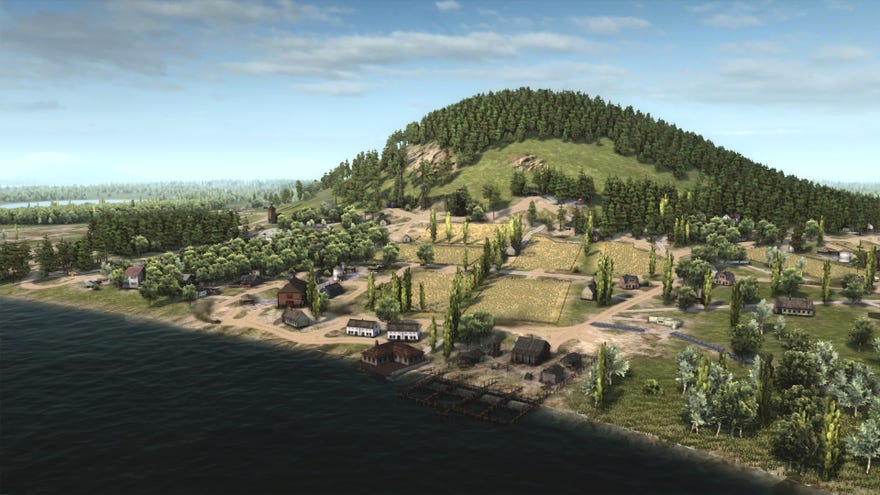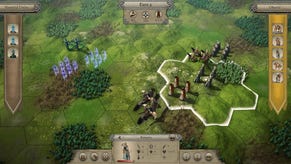The Rally Point: Don't krai for me in Workers & Resources: Soviet Republic
Modding our way back to village life in this industrial logistics sim
I cannot pull myself away. This paragraph started about 40 minutes ago, when I reopened Workers & Resources: Soviet Republic "to check something". I'll do this again several times. You probably know that this is a Soviet-themed city builder. You might know it's complex and big on how your cities are organised. If you've played it, you know that it's a hefty logistical sim (note: W&R includes options to dramatically dial down this side of things if that's your preference).
What you might not know is how brilliant it is when you reject building a large-scale industrial behemoth, and play it as a backwards rural village dependent entirely on horses.
Before I elaborate, I have to thank the modders. In particular, Fiend, whose small houses and wooden shacks are where this increasingly obsessive journey started. The town I built with these proved a gateway to the work of Novu, whose collection of tiny buildings made most of this possible.
But what is this? Well. Workers And Resources can be played several ways. Apart from its theme (which can't really be divorced from its practical details, but I'm downplaying it here because all these mods pushed it aside somewhat), it's defined by its economic structure and its focus on production and logistics. When you start playing, you'll soon realise you need to learn how everything connects together to get the most basic things done. A mine won't function without power, but putting a power plant down isn't enough, since you'll also need to connect it with one of a dozen types of electrical cable. Even skipping past how unintuitive this system is to a beginner, you'll then need housing so there's someone to operate those buildings, and those people will need food and clothes and doctors and childcare and then you'll realise they need elaborate road and footpath networks to access any of it. And this is just to get that mine working.
Only, wait, nobody's working in the power plant. Oh, I have to provide public transport and manual bus routes or a car dealer and car parks. It goes on, and on. And it's fun! You'll have some sort of city going before long, because most of the basics are logical. Iron needs smelting, which means coal. Pubs make people happy but are bad for their health. Workers can't work if they have to look after a sprog. But you'll soon realise that you're not making any money. This is a socialist republic, see, and while all those people will live and work where you say, they won't help you earn any money or turn a profit. So you'll want to start exporting something to get one of the two external currencies you're paying for all these workers and resources with.
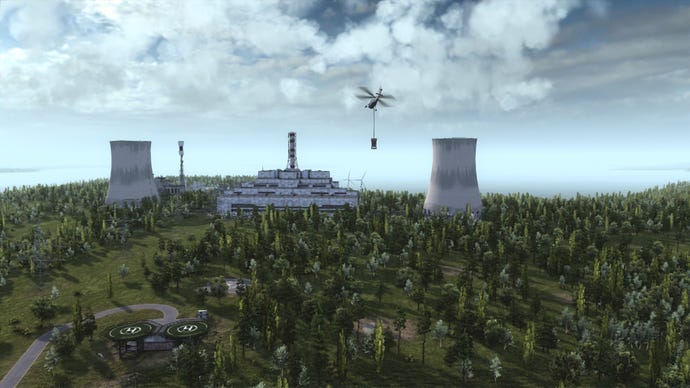
When you plonk a building down, for example, you can pay to have the materials and labour teleported to the site automatically, including a delivery fee. But you can also produce everything yourself. You can mine stone, load it onto trucks bound for a processing plant to make gravel, then convey that to a storage facility. Then you can make a dumper truck stay at the construction office, and disable auto-building, and that truck will then drive to the storage facility, pick up the gravel, and deliver it to the building site. Do the same with wood, steel, asphalt, buy (or later manufacture) cranes and excavators, and have a bus pick up workers and drop them off on site and you can build everything from scratch.
It is enormously elaborate. And it is brilliant.
And then you realise, if you're me, that you want little huts. I'm fine with the brutalist style and mega-industrial scale - it would be weird not to indulge in that for the region and era it's set in. Its devs and community share a sincere enthusiasm that I respect and adore, too, with many of its mods introducing buildings and monuments based on real shops and houses or just interesting old abandoned ruins from places as disparate as East Germany, Yugoslavia and Slovakia. None of what follows is a rejection of the game's style. I just want little huts.
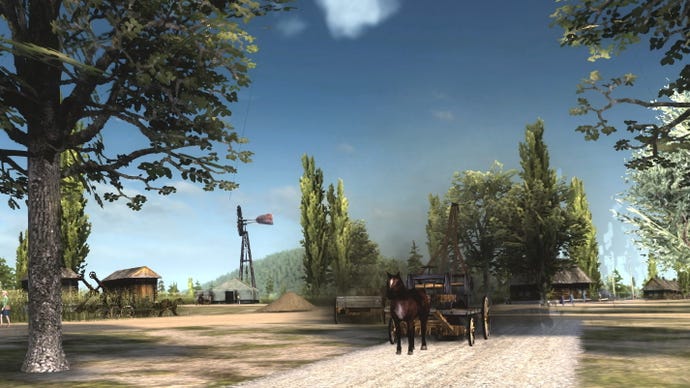
And those little huts needed dirt roads (using some of LM25SD's textures) and small scale industries that fit better than giant concrete blots. And then I discovered Novu's horse and cart mods. Horses. Can I... can I play the industrial titan game without modern logistics? Oh my god, yes.
All this belongs in an earlier era, so I learned how to modify the calendar so there are only horses. Thankfully, many vehicle mods work outside the vanilla era, and editing vehicle properties is very simple. Throw in some small scale agricultural manufacturing by OffTheRailsGaming and consider yourselves welcome, friends, to the glorious republic of Stubborn Dawn, population 400. In a good year.
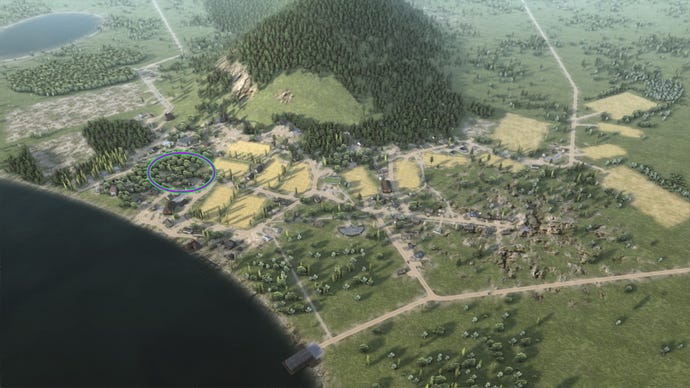
Once I'd got some basics, I threw away all my money, you see. A standard financial start gives you 3.5 million rubles. The treasury of my village has so far peaked at 6000, and I immediately spent that on more horses, a couple of teachers, and some steel. It was ages before I could even produce concrete, because concrete has to be mixed on site, but the concrete mixer needed steel, which we couldn't produce and was very expensive to import.
Not only have I loved every minute, but I'm stunned at how this setup's incredibly limited logistical options have guided my development in such a realistic way.
To pay for it, I turned our famous farms' (worked entirely by hand for several years until even my obstinance gave way to buying some draft horses) output into food exports, then after over a year of building a microbrewery, alcohol sold for an unthinkable 800 rubles for every wagon I managed to send along the two-day journey to the border, where you have to deliver any goods for sale. At the end of it, I built (using auto-build, a sadly necessary 'cheat' in a strict few circumstances) one of Novu's horse feeding stations, which cleverly, somehow, allow the horses to 'refuel' on crops. You can also 'build' horses for use or sale via one of their clever hacks, but I don't yet have the spare transport capacity to set that up.
Imagine a horse pulling a wagon full of bread and potatoes and perhaps a few bottles of ale or vodka along a dirt road. A lonely journey punctuated only by nightfall, perhaps some snow, and finally that first glimpse of the watering hole. On the way out, you'll pass the watchtower (named Last Chance so you know this is when to turn back if you've forgotten something), and now the name of the second neighbourhood of the village, once a dusty, Deadwood-esque single lane for the quarry, now the thriving, Deadwood-esque hub of the village.
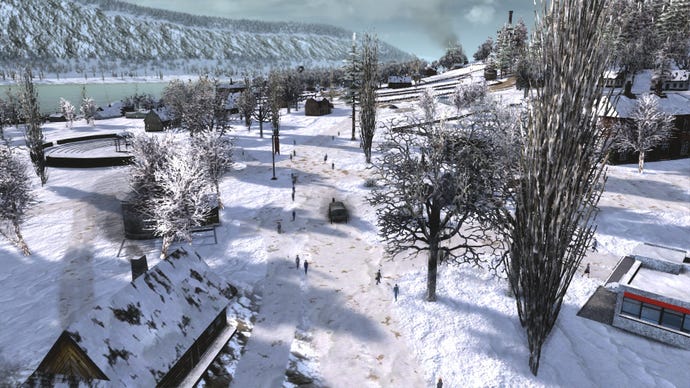
It has been hard. But it hasn't felt masochistic. It already feels good in the base game to figure things out and make parts connect. This has narrowed my focus to the point where I appreciate every detail. Not only have I loved every minute, but I'm stunned at how this setup's incredibly limited logistical options have guided my development in such a realistic way.
My horses are slow and their capacity so tiny that I have to expand slowly and deliberately. A humble grain silo is a significant village-wide project. It's society's focus for six months. Most things I could build have to be weighed up against their opportunity cost - we can afford a quadrupedal fire "truck", or have a wagon buy enough steel for a school. We can swap alcohol for importing clothes, or build a mill and turn crops into textiles that are less profitable but build a long-term foundation for sartorial self-sufficiency.
These decisions don't feel 'gamey'. They feel like a settlement making decisions about its identity and future. And I can feel that future coming very slowly. Steps that you'd automatically race past become eras in which generations live and die knowing that life around here will not dramatically change. I can see the village's history. I know every street. I've even named every house. I'm toying with the possibility of recording a wagon's tour of the town in its charmingly wonky first-person mode. This is a real place. I could write another whole article on its history (and almost did), culminating in a giddying 500 villagers celebrating both a successful harvest and the construction of the Stubborn Dawn Agricultural Institute (thank you, uh... Kurt Cobain? Huh).
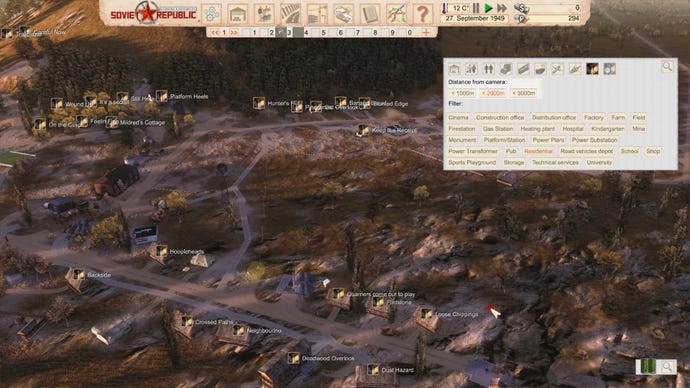
What impresses me most is that while all these modders kindly worked long and hard to make all this possible, none of them changed anything structural. You'd assume, often rightly, that playing a game pretty much the opposite of how it's intended (ie: going small and backwards instead of big and forwards) would break it, or take enormous rejigging of engines and elaborate scripts. But though the stylings of this weird playstyle come from the rural mods, its function is almost entirely down to how Workers & Resources is already designed. Its logistics and construction and management are exactly the same.
I could say some negative things, mostly about road building and slopes and some utterly bizarre pedestrian AI. But my heart's not in it. For one thing, most of my complaints are cases of, "I want more! Me, me, me!", but the real reason is that my heart is in Stubborn Dawn.
